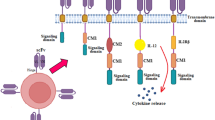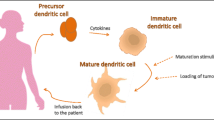Abstract
There is now considerable evidence that human tumors often express antigens that render them susceptible to lysis by cytotoxic T lymphocytes (CTLs). These findings have raised hope for the development of cancer vaccines to trigger a tumor-specific immune response in cancer patients. To optimize the immunogenicity of cancer vaccines, it is important to improve the monitoring of the immune response. The use of tetrameric soluble major histocompatibility complex (MHC) class I/peptide complexes (“tetramers”) to identify tumor-specific CTLs has shown that these novel reagents allow rapid and accurate analysis of human CTL responses in cancer patients. We have used fluorescence-driven cell sorting to clone tumor-specific CTLs after staining with tetrameric MHC class I/peptide complexes. Analysis of melanoma-infiltrated lymph nodes revealed that strong CTL responses often occur in vivo, and that the reactive CTLs have substantial proliferative and tumoricidal potential.
Similar content being viewed by others
Author information
Authors and Affiliations
Rights and permissions
About this article
Cite this article
Cerundolo, V. Use of major histocompatibility complex class I tetramers to monitor tumor-specific cytotoxic T lymphocyte response in melanoma patients. Cancer Chemother Pharmacol 46 (Suppl 1), S83–S85 (2000). https://doi.org/10.1007/PL00014056
Issue Date:
DOI: https://doi.org/10.1007/PL00014056




